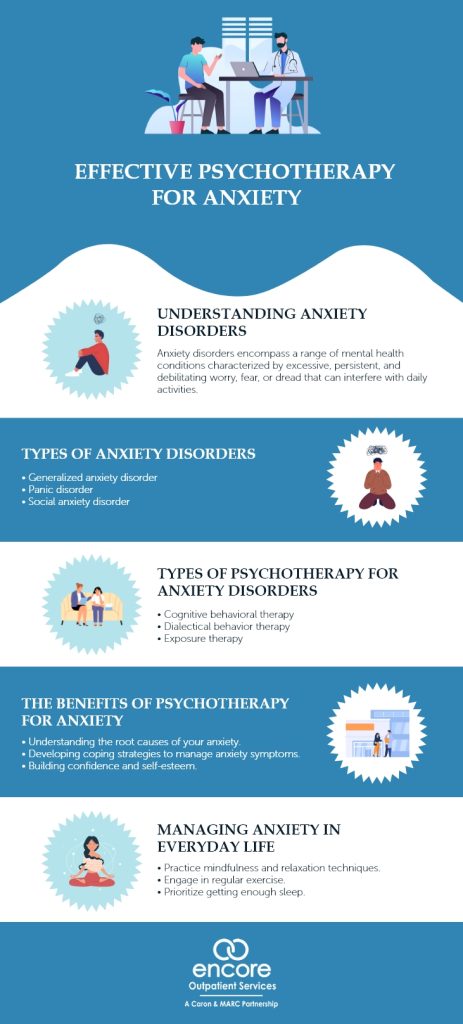Explore research-backed techniques through counselling for anxiety disorder programs
Explore research-backed techniques through counselling for anxiety disorder programs
Blog Article
Exploring Different Strategies in Therapy for Anxiousness Disorder for Enduring Change
When dealing with stress and anxiety disorders, it's necessary to explore a variety of counseling approaches. Each method provides distinct insights and tools to help you handle your signs and symptoms effectively. You might locate that incorporating strategies can generate the ideal outcomes. Comprehending the nuances of these approaches is vital to cultivating enduring modification. What if the right mix could launch a brand-new degree of psychological health for you?
Understanding Stress And Anxiety Problems: A Brief Introduction
Stress and anxiety problems, which impact millions of individuals worldwide, can significantly affect day-to-day life. You may experience overwhelming feelings of worry or stress that seem uncontrollable. These feelings can lead to physical signs and symptoms like a racing heart, sweating, or also dizziness. Common kinds of anxiousness disorders include generalized anxiety condition, panic condition, and social anxiety problem. Each has special signs, however they all share a tendency to interrupt your routine and relationships.Understanding the origin causes of your anxiousness is important. It could come from genes, brain chemistry, or life experiences. Acknowledging your triggers can help you manage your responses better. It is essential to keep in mind that you're not the only one in this struggle. Many individuals deal with comparable challenges, and looking for help is a strong action towards sensation better. By discovering stress and anxiety conditions, you're currently on the path to understanding and managing your problem better.
Cognitive-Behavioral Treatment: Challenging Unfavorable Idea Patterns
In Cognitive-Behavioral Treatment, you'll begin by identifying the negative idea causes that add to your stress and anxiety. You'll work on replacing them with more positive choices when you identify these thoughts. Together, you'll build reliable coping techniques to assist manage your anxiety in day-to-day circumstances.
Recognizing Unfavorable Idea Triggers

When you encounter minutes of distress, recognizing the particular triggers behind your unfavorable thoughts can be important in handling stress and anxiety. Start by paying attention to situations that provoke sensations of concern or anxiety. Is it a jampacked room, an approaching deadline, or a conversation with specific individuals? Write down these instances in a journal. This will aid you recognize patterns in your reasoning. Notice physical feelings that accompany your unfavorable thoughts, like a racing heart or rigidity in your breast. By identifying these triggers, you get insight into what's sustaining your anxiousness. Comprehending these connections is the first step in challenging those thoughts and ultimately restoring control over your emotional responses.
Replacing Ideas With Positives
Testing adverse idea patterns is a crucial action in transforming your way of thinking and lowering anxiousness. You may often discover on your own trapped in cycles of insecurity or catastrophic thinking. Rather than letting these thoughts dictate your sensations, practice replacing them with favorable affirmations or realistic options. For example, when you believe, "I can not handle this," change it to, "I can manage obstacles one step each time." This basic adjustment can greatly affect your mood. Frequently recognizing and responding to these unfavorable ideas aids develop a much healthier interior dialogue. Keep in mind, it takes time and initiative, yet continually practicing this method can bring about lasting adjustment, equipping you to deal with anxiety with restored confidence and durability.
Structure Coping Strategies With Each Other
Replacing negative thoughts is only the start of managing stress and anxiety successfully. To develop long-term adjustment, you require to build coping techniques that empower you. Cognitive-Behavioral Therapy (CBT) assists you determine and test those unhelpful idea patterns. With each other, you and your therapist can discover just how these thoughts impact your feelings and behaviors.Start by establishing useful techniques, like journaling or mindfulness exercises, that permit you to confront anxiousness head-on. When you face your anxieties slowly, you'll learn to respond in different ways.

Mindfulness and Acceptance-Based Approaches: Growing Present-Moment Understanding
As you navigate the complexities of anxiety, incorporating mindfulness and acceptance-based approaches can significantly enhance your ability to cultivate present-moment understanding. By focusing on the present moment, you'll locate that you can observe your thoughts and feelings without judgment (Counseling services for anxiety). This technique aids you recognize your stress and anxiety without really feeling overwhelmed by it.Engaging in mindfulness workouts, such as deep breathing, body scans, or directed reflections, allows you to ground on your own in your present experience. Acceptance-based approaches urge you to embrace your feelings rather than fight against them. They shed their power over you.Incorporating these practices into your everyday routine can change just how you respond to anxiousness when you approve your feelings. You'll create strength and find out to browse demanding scenarios with better ease. Eventually, growing present-moment understanding lays the foundation for long-term adjustment, equipping you to lead a much more meeting life
Direct Exposure Therapy: Challenging Worries Slowly
Exposure therapy assists you face your worries in a steady method, making it less frustrating. You'll find out techniques to face anxiety-provoking scenarios detailed, while also constructing coping approaches to manage your responses. This technique encourages you to take control and lower anxiousness in time.
Gradual Exposure Strategies

When dealing with anxiousness, progressively challenging your concerns can be an effective method to gain back control. This strategy, recognized as steady exposure, includes slowly revealing on your own to the scenarios or things that trigger your anxiety. Begin with much less daunting situations and gradually work your way as much as even more difficult ones. As an example, if you're scared of public talking, you could begin by speaking in front of a mirror, after that advance to sharing ideas with a buddy, and at some point deal with a small team. Each step aids desensitize you to the concern, building your self-confidence over time. Bear in mind, it's important to speed on your own and celebrate little success as you move via this procedure, reinforcing your capacity to handle anxiousness efficiently.
Building Coping Approaches
Structure effective coping methods is crucial for handling anxiety, specifically as you challenge your concerns gradually - Counseling services for anxiety. One powerful technique is exposure therapy, where you start by encountering your concerns in a regulated way. Begin with less frightening situations and slowly function your method as much as more difficult situations. This steady direct exposure aids desensitize you to anxiety triggers, making them much less overwhelming.Incorporate relaxation strategies, such as deep breathing or mindfulness, to relax your mind throughout direct exposure. Track your progress, commemorating little success in the process to enhance your confidence. Bear in mind, it's alright to take your time; the goal isn't excellence yet consistent enhancement. By developing these methods, you'll encourage yourself to browse anxiousness and welcome life a lot more completely
Psychodynamic Therapy: Discovering Source of Anxiety
Psychodynamic treatment explores the subconscious mind, disclosing the source of your stress and anxiety. By analyzing your thoughts, sensations, and previous experiences, this method aids you uncover underlying conflicts and unsettled concerns that might add to your present anxiousness. You'll collaborate with a therapist to examine childhood years experiences, relationships, and emotional patterns that shape your feedbacks today.As you get understanding into these much deeper layers of your subconscious, you'll start to acknowledge just how previous events influence your existing habits. This understanding can bring about catharsis, allowing you to refine emotions you might have suppressed.Through the restorative relationship, you can likewise identify defense reaction that might have created gradually, providing a clearer path to change. Ultimately, psychodynamic therapy outfits you with the devices to address your anxiety at its core, promoting long lasting change in your psychological wellness.
Alternative and integrative Techniques: Combining Techniques for Greater Efficiency
Incorporating various therapeutic techniques can enhance your trip towards managing stress and anxiety a lot more effectively. By incorporating components from cognitive-behavioral treatment, mindfulness methods, and holistic approaches, you can create a personalized technique that resolves your one-of-a-kind needs. You might make use of cognitive-behavioral strategies to test adverse thought patterns while incorporating mindfulness exercises to ground yourself in the existing moment.Additionally, discovering holistic anchor techniques such as yoga exercise or reflection can advertise relaxation and minimize anxiety signs. This blend permits you to develop better self-awareness and resilience.Experimenting with these varied approaches can aid you find what resonates most with you. Bear in mind, it's regarding locating a synergy that works, as opposed to staying with a single method. This integrative strategy check my site not just supplies immediate alleviation however additionally fosters long-term abilities for taking care of anxiousness, empowering you to reclaim control over your life.
The Duty of Support Equipments: Structure Durability Through Connection
While it might appear that managing anxiety is a solitary trip, having a strong support group can play a crucial duty in your resilience. Surrounding yourself with understanding pals, household, or support system develops a secure space where you can openly share your feelings and experiences. When you get in touch with others, you remind yourself that you're not alone in this struggle.These connections provide support and can give sensible coping techniques that have actually helped others. It's likewise an opportunity to get perspective; buddies can help you see circumstances in different ways, minimizing sensations of isolation.Moreover, emotional support fosters a feeling of belonging, which can greatly reduce stress and anxiety signs and symptoms. By leaning on your support group, you can develop resilience and deal with challenges better. Remember, connecting for help signifies strength, and it can make all the difference in your journey toward handling anxiety.
Frequently Asked Questions
What Are the Usual Signs And Symptoms of Anxiety Problems?
You might experience restlessness, exhaustion, difficulty concentrating, irritation, muscular tissue stress, and sleep disturbances. Physical symptoms can include fast heartbeat, sweating, and trembling. Recognizing these signs early can assist you look for ideal support and therapy.
How Much Time Does Treatment Normally Last for Anxiousness Conditions?
Treatment for stress and anxiety problems commonly lasts anywhere from a couple of weeks to numerous months. It actually depends on your private requirements, progress, and the strategies your specialist utilizes to help you handle your anxiety efficiently.
Can Medicine Be Used Along With Therapy for Stress and anxiety?
Yes, medication can absolutely be used alongside treatment for anxiousness. Integrating both methods commonly boosts treatment performance, helping you handle signs and symptoms while checking out underlying concerns through counseling (Counseling services for anxiety). Constantly consult your doctor for customized recommendations
Are There Self-Help Techniques for Handling Stress And Anxiety?
Yes, there are a number of self-help strategies for managing stress and anxiety. You can practice mindfulness, engage in normal workout, preserve a balanced diet regimen, develop a routine, and use deep breathing strategies to aid reduce anxiety signs successfully.
How Do I Know if I Required Professional Assistance for Stress And Anxiety?

Report this page